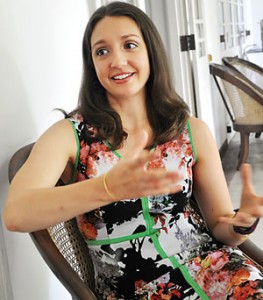Everyone has a right to contribute to the economy

Kali Wasenko. Pic by Nilan Maligaspe
American public affairs specialist Kali Wasenko delivered a lecture at the US-Sri Lanka Fulbright Commission on perception and reactions to people with disabilities and American legislation on disability rights late last month. Wasenko was hosted for this talk by Fulbright alongside the University of Kelaniya’s Department of Disability Studies, Faculty of Medicine Ragama and Centre for Disability Studies.
Wasenko’s lecture on June 29 focused heavily on the Americans with Disabilities Act, a civil rights law that prohibits discrimination against individuals with disabilities in all areas of public life including jobs, schools, transportation, and all public and private places that are open to the general public. She tackled in particular the employment of persons with disabilities, highlighting “reasonable accommodations” that must be made under the Act in interviewing and recruiting persons with disabilities.
For example, in the US the Act protects the privacy of such persons during the job recruitment process; potential employers cannot directly or indirectly probe into the person’s disability- “even if you have a blind person applying for a truck driving job,” she noted. Employers may, however, request the applicants to demonstrate their capability to perform the job. If reasonable accommodations can be made – such as rearranging a filing system so that a physically restrained person may access it or investing in a specially designed computer for their use - then employers must make that provision. Most accommodations can be made with relatively little expense, noted Wasenko.
Speaking to the Sunday Times before her talk, Wasenko explained that many persons with disabilities are capable and keen on contributing to the economy. “For most of us our careers are tied up with a sense of self-worth,” she said. “By creating more opportunities for people with disabilities, you’re contributing to the economy. They’re also consumers-what you earn, you spend.”
Wasenko’s involvement in this field stems from a personal place; her brother has Down’s Syndrome and from a young age she was inspired by her parents’ attitude in making sure he had access to the same things as everyone else. She’s also a long-time volunteer with Best Buddies International-the group uses a friendship and communications based programme that she strongly believes in, and thinks could be used as a model for integration everywhere.
Currently based with the District of Columbia’s Office for Disability Rights as a Public Affairs specialist, her role is compliance based; ensuring that the Americans with Disabilities Act is adhered to by employers, builders and other agencies. She also oversees community engagement and advocacy, and serves as staff liaison to the DC Commission on Persons with Disabilities.
In Sri Lanka, Wasenko is representing herself. She’s here with her fiancée and reached out to a few organizations to express her willingness to help. The University of Kelaniya was quick to respond. Wasenko even found that a video she created on workplace engagement had been in use by the university for a couple of years. She was delighted. “Young people are really quick to get the hang of it,” she noted about raising awareness about inclusion.
On the issue of universal access, an important design tenet that most countries have struggled to implement fully, “Physical accessibility is key,” Wasenko stressed. “Building in a way that accommodates the needs of persons with disabilities is so important. Public offices in particular have to be accessible.”
Section 23 of the Protection of the Rights of Persons with Disabilities Act (No 28 of 1996) provides provisions for the protection and advancement of persons with disabilities in Sri Lanka. Here, it clearly states that ‘(2) No person with a disability shall, on the ground of such disability, be subject to any liability, restriction or condition with regard to access to, or use of, any building or place which any other member of the public has access to or is entitled to use, whether on the payment of any fee or not.’ However many buildings-including public spaces have failed to make these provisions. Wasenko suggests that the best way to ensure access for all is by including persons with disabilities in the decision making process. This is also a very effective way to engage with communities, raise awareness and ensure that processes and buildings are friendly to persons with disabilities, she added.


